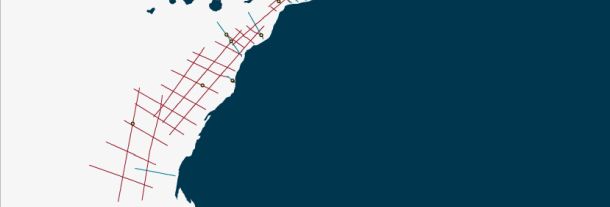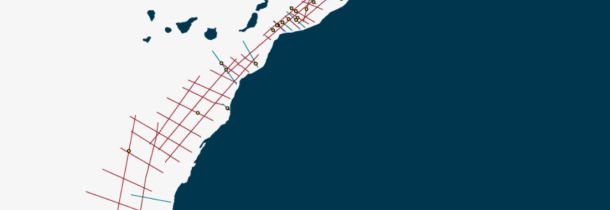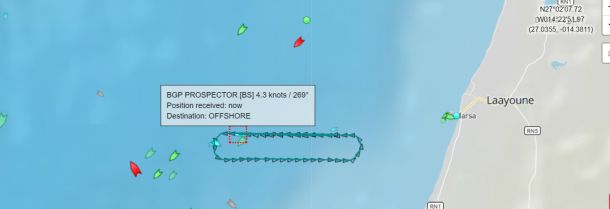
With all multinational oil companies in occupied Western Sahara having abandoned their activities, the Moroccan government is trying to catch interest of new investors for further illegal oil exploration. Russian and Chinese state-owned companies, commissioned by a UK firm, are behind a large exploration programme.
Recent years have seen the departure of all the multinationals from the exploration of oil and gas in occupied Western Sahara, notably Glencore, Kosmos Energy, Cairn Energy and Total. Such exploration was found by the UN Legal Counsel in 2002 to be illegal unless the people of Western Sahara consent to it. But they do not. And since 2016, the legal risk of operating in the territory has increased following landmark judgments by the Court of Justice of the EU. The largest company today involved in Western Sahara's oil potential, is Irish/UK firm San Leon Energy, which halted its operations for "security" reasons, ending up being penalized by Moroccan government for not following up on its promised onshore exploration programme.
Now, the Moroccan state oil company ONHYM tries to attract new international partners for its controversial plans, through acquisition and sales of new exploration data.
In 2016, ONHYM commissioned a subsidiary of the Polish government oil firm PGNiG Group to undertake onshore exploration, something which proceeded as planned until the operation received large media exposure in Poland, and the company all of a sudden abandoned the operations and equipment due to 'political reasons'. It is not known whether this large onshore seismic study was ever concluded.
From 2017 - and this is what Western Sahara Resource Watch now can report on - ONHYM has engaged in a large offshore programme. In 2017, ONHYM carried out a 14,986 km 2D seismic study in the waters of Morocco - and Western Sahara. This information appears on the website of the UK geophysical and geological services company Geoex Ltd [download], a firm "focused on providing support to Oil & Gas companies and governments to develop an efficient exploration strategy". Geoex has started marketing in business journals (see here, page 47 and here, page 7) that the data will be available for the industry for Q32018. According to Geoex, the offshore study was made "in partnership with BGP", which is a subsidiary of the Chinese national oil company CNPC. Geoex's partnership with BGP Marine is elaborated on the Geoex website. "This seismic survey will be the geological backbone for your analysis and selection of highly prospective areas and making future license applications", Geoex explains to its readership of international oil companies.

The information of Geoex's exploration work corresponds with the movements of a flotilla of vessels that WSRW observed in the waters off Western Sahara last year, but which we have not yet reported on. From August 2017 through 11 December 2017, WSRW observed the Chinese vessel Dongfang Kantan No. 1, with the supply vessel m.v. BGP Supply II and the support vessel Jan Van Gent from south of the Bay of Cintra past Dakhla, to north of El Aauin. Dongfang Kantan No. 1 is a vessel operated by BGP Inc, see BGP website. The picture of Dongfang Kantan No. 1 is to be found on the website of Geoex.
While these studies took place, right offshore Dakhla, in February 2018, the former president of BGP's parent company, Dr. Sun Xiansheng, was awarded a "golden medal" at the controversial Crans Montana Forum, held by Morocco in the town on Dakhla, on occupied land. Dr. Xiansheng got the "award" in capacity of being Secretary General of the International Energy Forum (IEF).

Not only has Geoex Ltd cooperated with Chinese state owned BGP, but also with a similar Russian company: Rosgeo, a fully Russia state-owned enterprise. Rosgeo announced in a release of 26 March 2018 that one of its vessels undertook "3D seismic operations offshore Morocco in the size of 1000 sq. km for Geoex Ltd" (or download). On 7 July 2018, WSRW wrote that the Moroccan state owned oil company ONHYM had concluded a 3D study on the area that goes under the name “Boujdour Shallow Offshore". The study was done by the Russian research vessel Akademik Primakov, in Rosgeo's fleet. The picture to the right shows the tracks of the Akademik Primakov off Dakhla. The Rosgeo-Geoex partnership and exploration of Akademik Primakov is also mentioned in this Russian publication.
Rosgeo had on 19 October 2017, during of a visit of Russian prime minister Dmitry Medvedev to Morocco, signed a cooperation agreement with ONHYM regarding "the establishment of mutually beneficial long-term cooperation of the parties in the field of geological prospecting works".
Western Sahara Resource Watch on 20 July 2018 sent a letter to Geoex calling for an immediate halt of the plans to sell geological data belonging to the people of Western Sahara, which it had collected in partnership with the Russian and Chinese state-owned companies.
"Geoex has no right to acquire or sell data of the seafloor of Western Sahara in partnership with the Moroccan government. Contributing to Morocco’s oil exploration in Western Sahara will directly undermine the rights of the Saharawis and the UN peace process. We call you to follow the example of TGS-Nopec and the other seismic study companies that have regretted their involvement in such operations. As former executive in TGS-Nopec, Mr. Benichou, you should be well aware of how this is considered to in breach of basic corporate responsibility standards", WSRW wrote to the company.
The two Geoex programmes in 2017 and 2018 raise the question about which other observed offshore exploration activities in 2017 and 2018 could in fact have been ONHYM work, and not done by the operators of different licences on which the exploration work took place. When WSRW in the past has observed the movement of seismic study fleets on an area covered by a licence operated by foreign company, WSRW has taken for granted that it was the operator of the licence that was responsible for the activities. However, it may not be the case. It could also well be ONHYM directly.
There are in particular four previous and current BGP operations that could potentially have been done by ONHYM/Geoex :
1) A February 2017 study undertaken on Foum Ognit, by vessel BGP Prospector, a licence operated by New Age. WSRW reported at the time that it was being done by New Age/Glencore, but in theory it could also have been done by ONHYM directly.
2) In March 2017 by the BGP Prospector carried out a study on what corresponds to the Boujdour Maritime licence. WSRW reported at the time that it was being done by the operator on the oil block, Kosmos Energy, but in theory it could also have been done by ONHYM itself. When the Western Sahara liberation movement Polisario sent a letter of protest to Kosmos, the company responded in a letter on 15 February 2017 that "Kosmos Energy is not currently conducting a seismic survey offshore Western Sahara".
3) A surprising February 2018 study undertaken by BGP Prospector on the same Boujdour Maritime licence, shortly after the operator Kosmos had announced its departure from the block. “Is Kosmos Energy undertaking a last survey on the Boujdour Maritime licence before it waves goodbye to occupied Western Sahara? Or has an unknown company taken over the licence?”, WSRW wrote. In hindsight, this might well have been ONHYM. Yet, the Annual Report of Cairn Energy for 2017, presented at the 2018 AGM, stated that as the Kosmos/Cairn Joint-Venture on Boujdour had an obligation to "fulfil its contractual obligations and complete the 3D seismic acquisition currently underway".
4) BGP Prospector, finally, has over the course of the last weeks been operating off the coast of Dakhla, in an area that was previously held by Total. WSRW has so far not written about this programme on its website. No multinational oil companies are known to be operator of any block in these waters. BGP Prospector sent out a safety warning (here and here), dated 19 June 2018, alerting that this latter study is to end on 18 July 2018. Already on 7 July 2018, the vessel left Saharawi waters, entering the port of Las Palmas, probably having concluded the work. This study is most probably an ONHYM operation.
The fact that the above operations probably were carried out by ONHYM and seemingly not by the operator of each licence, does not put in question the role of the operating companies in carrying out the other seismic studies mentioned by WSRW over the years.
Geoex Ltd is founded and chaired by French national Pierre Benichou, a familiar name in the controversial business of exploring oil in Western Sahara. Benichou had an executive position in the Norwegian seismic services company TGS-Nopec at the time when it undertook the first ever seismic study under Moroccan occupation in mid-2002. This happened only half a year after the UN Legal Counsel concluded that no further exploration could take place unless with the consent of the people of the territory. After critique from investors and the Norwegian Government, TGS-Nopec terminated its operations, underlining in a press release that it "appreciates the complexity of the political issues in the area and respects the views stated by Norwegian authorities. As a result, the Company has decided not to undertake any new projects in Western Sahara without a change in political developments. Further, the Company is committed to improve its procedures for risk evaluation on potential projects in disputed areas of the world and will actively seek advice from Norwegian authorities when in doubt."
At the time of this TGS-Nopec statement, the current president of Geoex, Pierre Benichou, was the president of TGS-Nopec's Africa, Middle East, and Far East Division. From what Western Sahara Resource Watch understands, the person directly responsible for initiating and running TGS-Nopec's involvement in Western Sahara/Morocco was Benichou himself. Benichou is said to have been born in Morocco, where he supposedly also had his early education together with people who would later become government figures in Morocco. The first 2002 press release of TGS-Nopec, in which it announces its operations in "Southern Morocco", was signed by Pierre Benichou (see below).
As TGS-Nopec exited the occupied territory in 2003, the Norwegian Support Committee for Western Sahara sent letters to all seismic services companies in the world, requesting them not to proceed with studies in the occupied waters. One of these companies, contacted on 27 May 2003, was Sevmorneftegeofizika, a subsidiary of Rosgeo, the owner of the above-mentioned vessel Akademik Primakov involved in the ONHYM 3D study in Western Sahara in 2018, 15 years later. Sevmorneftegeofizika never responded to the letter. TGS-Nopec seems furthermore to have partnered with Sevmorneftegeofizika - or SMNG, as it is abbreviated - during its May 2002-January 2003 study in Western Sahara. BGP was also one of the companies warned in 2003.
The mentioned marketing announcements that Geoex has placed in international journals include the logos of two related companies: Geoex and its Norwegian subsidiary Multiclient Geophysical, registered in Norway. The latter was de-listed from the Oslo Stock Exchange in 2017, and acquired by Geoex. Pierre Benichou is chairman of both companies. Geoex Ltd owns 98% of Multiclient Geophysical according to the Norwegian shareholders registry. Geoex Ltd’s bank account in Lloyds Bank is denominated in the currency of "Norwegian Krone" (page 18 in this document from 2017).

GeoEx pushes seismic data from occupied land
The UK company GeoEx is now trying to sell the seismic data it collected of the seafloor of occupied Western Sahara. WSRW warns possible clients to stay away.
Geo Service 1 spotted in occupied Western Sahara
Kosmos Energy's supply vessel Geo Service 1 was observed yesterday in occupied Western Sahara.
Here is Kosmos Energy's supply vessel
At the Spanish government owned harbour of Las Palmas today, Geo Service 1 is bunkering supplies for the illegal Moroccan oil studies offshore occupied Western Sahara. The studies take place not too far away from Spanish waters.
Glencore steps up oil search offshore occupied Western Sahara
The Swiss company is undertaking more seismic studies and has entered into a renewed contract on a neighbouring block, offshore the occupied territory.


